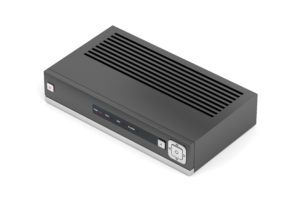NVRs vs DVRs offer dependable video surveillance, allowing you to capture what’s happening inside and outside your business. However, there are essential differences between the two systems, especially in terms of how video footage is stored—and how it’s viewed.
Choosing the right system for your business is critical because you want to be sure you have the most accurate view of your premises, whether in real-time or via recorded clips.
Here’s what you need to know.
The main difference between NVRs and DVRs
The primary difference between NVR and DVR systems is that NVR systems process video footage at the camera, whereas DVR systems process it at the recorder.
What does that mean?
It all boils down to how the systems process raw video data for storage and viewing. NVR – which stands for network video recorder – is purpose-built for digital video data. Most of today’s “IP cameras” and Wi-Fi cameras are NVR because the footage is processed at the camera, allowing for more accessible storage and streaming over the Internet. The raw video data is processed before it’s transmitted to the recorder (i.e. a disk drive, SD card, USB flash drive, etc.).
In contrast, for digital video recorders, DVR starts with analogue video data and then converts it to a digital format at the recorder.
Why it matters
How your security footage is processed and stored affects how easily you can access it. That includes real-time video and recorded clips.
Traditional DVR security cameras are designed more for on-premise storage than streaming video over the Internet. DVR is sometimes referred to as CCTV (closed-circuit television). In theory, the video footage stays on the local storage device. (However, some DVR recorders can be configured for remotely accessing the stored video footage.)
Since NVR security systems process video data at the camera, this data is immediately ready to be transmitted over the Internet and to storage devices.
Which is better, NVR vs DVR?
Choosing NVR or DRV security cameras will depend on your unique security goals and needs. Both have advantages and can be deployed in any commercial environment, indoor or outdoor.
That said, NVR systems are typically considered more robust because of how they process video at the cameras. Advanced compression and processing capabilities allow for numerous types of video enhancement and instant streaming.
NVR cameras from PROTECTION PLUS, the system can automatically stabilize digital images to remove motion blur caused by wind or vibration. Plus, it can use multiple simultaneous frame captures at different exposure levels and low-light enhancements. This produces a superior video quality automatically. Advanced systems also allow for intelligent video analytics, such as facial recognition technology. NVRs also detect various types of audio, such as explosions, glass breakage, gunshots or a person screaming.
Of course, not every business will require these capabilities. The decision between NVR and DVR security cameras ultimately depends on your specific needs.
Let our experts help you decide
Request a no-obligation security system consultation from PROTECTION PLUS to learn more about your options. Our experts will go over your options in greater detail. They will provide business-specific recommendations to help you choose the right security camera system for your needs.
- Access Control
- Alarm monitoring
- Alarm Systems
- cannabis
- cannabis retailer
- CCTV Cameras
- Childproof Doors
- Commercial Security
- Construction Security
- Cybersecurity
- Digital Safety
- Door Bell
- Ethernet
- fire
- flood
- garage
- General Category
- Halloween
- holiday
- home
- home automation
- Home Safety
- Home Security
- Home Security System
- In the News
- intercom
- internet
- life insurance
- Locksmith
- Move Ahead
- moving
- MUL-T-LOCK
- natural disasters
- New Years
- Office Security
- Personal Safety
- Pet Protection
- real estate
- Safes
- Safes
- safety
- school
- Security Cameras
- Security Film
- Security Industry News
- Security Systems
- Security Tips
- security window film
- Senior Safety
- shoplifting
- Small Business
- Small Business security
- social media
- social network
- Sports Safety
- summer
- vacation
- Video Alarm Monitoring
- web
- web surfing
- Webdesign
- Window Film
- winter
- Workplace safety








